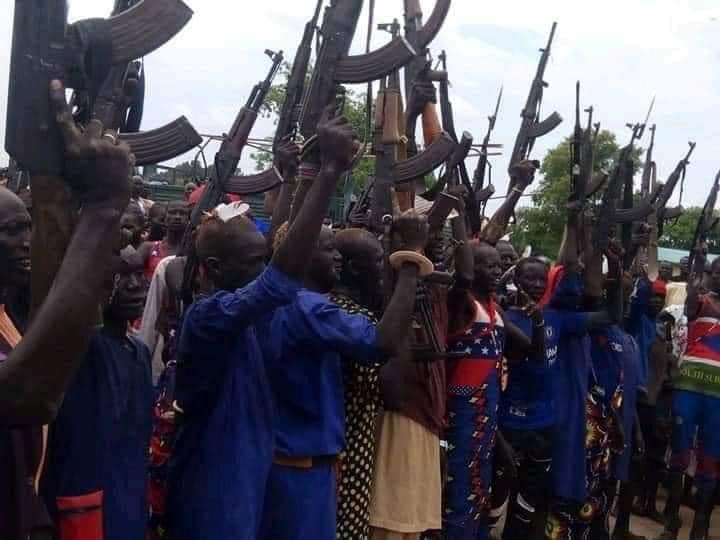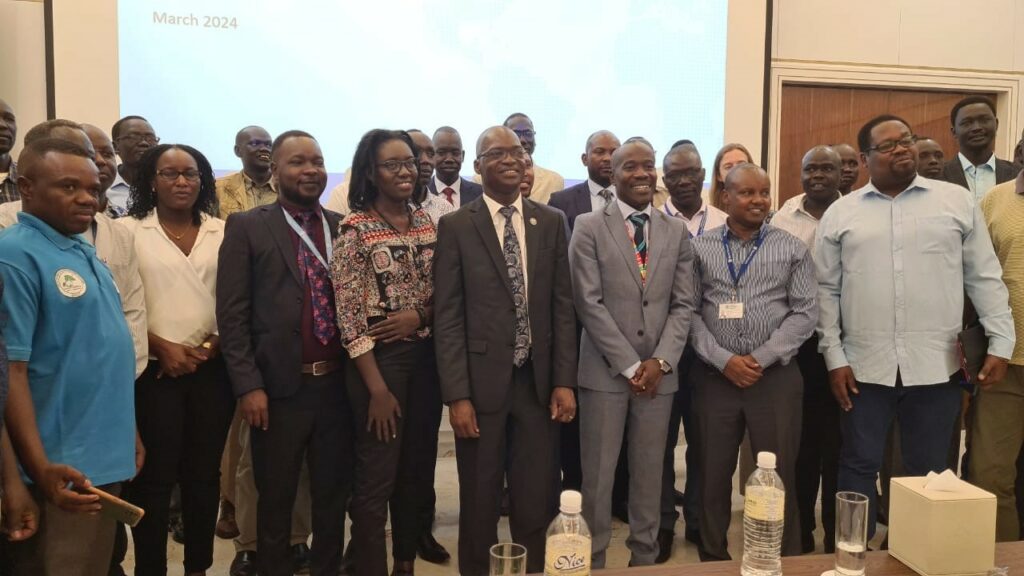
Armed youth in show of weaponry. | Courtesy
The Ministry of Peacebuilding and FAO have established in a new report that conflicts caused by the presence of firearms in the hands of civilians is one of the factors leading to South Sudan’s food insecurity situation.
The 57-page report was based on six of the ten states of South Sudan and studies the impact of conflict on food security and livelihoods.
It covers conflict dynamics at the national level as well as sub-national violence in Central Equatoria, Jonglei, Unity state, Upper Nile, Warrap, Western Bahr El Ghazal and Pibor Administrative area.
The report states that food insecurity in South Sudan is driven by surging shocks including conflict and the country’s economic crisis.
Other factors are climate-induced population displacement, persistent low agricultural levels and the climate shocks including floods and dry spells.
Meshak Malo, the Country Representative of Food and Agriculture Organization of the United Nations says much of the prevailing food insecurity is caused by conflicts in the farming areas.
“From the report, it’s clear that one of the major consequences and why South Sudan is food insecure is not because there are no resources,” Mr Malo told reporters after the launch the report in Juba on Wednesday.

“It’s about conflicts, it’s about the lack of peace that brings this, that’s why the partnership with the ministry of peacebuilding has been very quiet significant.”
“Out of the results that have come out, it’s clear that there are two major levels that are quite important so that peace is built, so that South Sudan can be able to exist from food aids and be able to produce its food for its people.”
The study used qualitative research approaches to understand the experiences, attitudes, behaviors and interactions in relations to conflict, food insecurity and the impact of floods.
Some of the key findings include political crisis such as significant levels of tension among different political groups driven by mistrust and perception of exclusion from governance process.
Another finding is the intercommunal conflicts attributed to historical rivalries driven by ethnic disputes and inter-state boundary conflicts.
The report also cited some respondents as saying they were not sure about the country’s readiness for the December 2024 general elections citing division across ethnic lines.
Meshak Malo call on communities and different levels of government to work for peace, adding that this will enable the country to enjoy the dividend of stability.
“Various governance issues are quite important to ensure that food security is able to be obtained,” he said.
“We have given one example for instance on the issue of one of the drivers which is cattle raiding in this country. There are over 15 million cattle, but still, we continue to import milk. We are 12 million.”
“If each cow could only produce 1 million, there is no reason why each South Sudanese should not have one liter of milk, but now we are importing milk from Uganda even from the Arab states, which is the powdered milk.”
“So those areas in which there is peace, there are the dividends of peace which will be food security, but once there is no peace the consequences of that is food insecurity.”
In Jonglei and the Pibor Administrative Area, the report recommends the need to engage youth, elders, chiefs, and political leaders in peace dialogue and establish peace agreements that will enhance behavioral change.
For Western Bahr el Ghazal state, it recommends strengthening the capacities of peace and security structures at the local level by providing knowledge, skills, and materials required to ensure they effectively undertake their work.
In Warrap, the report recommends bringing peace-related interventions to cattle camps so that young people receive information about conflict prevention and management and are supported to engage in dialogue processes.
And for Upper Nile, the report recommends the implementation of the adopted land policy to resolve conflict between different communities in the state.
Meanwhile, Pia Phillip, the Undersecretary of the national Ministry of peace build, agrees with the findings.
“The more we continue to fight among ourselves to cattle raid to fight each other over whatever resources we will remain food insecure and it’s not something that we want to do.”
“The report says if we are hungry today, it is because of our activities of fight among ourselves and conflict that we have intercommunal fighting.”
“I always say peace is not an activity or a package that the government must deliver on a silver plate. Peace is cultivated peace is nature. That’s when peace can be harvested by us.”
Support Eye Radio, the first independent radio broadcaster of news, information & entertainment in South Sudan.
Make a monthly or a one off contribution.
Copyright 2024. All rights reserved. Eye Radio is a product of Eye Media Limited.